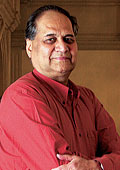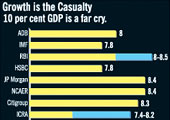|
Call it political
foresight or monetary balancing, but there's little denying that
the wise men in charge of the Indian economy have assigned top
priority to inflation over growth. There's no other choice. As
Amit Tandon, Managing Director, Fitch Ratings, remarks: "Inflation
pinches every soul on earth, whilst the fruits of growth don't
reach everybody." So if Y.V. Reddy, Governor, Reserve Bank
of India, has jacked up interest rates by 3 per cent in the past
one and a half years, it's with good reason. Clearly, Reddy is
attempting to slow down the gravy train of growth. And that's
reflected in the revised (downwards) estimates of the gross domestic
product (GDP) of various monetary agenices (see Growth is the
Casualty).
 |
"The
government has rightly addressed the fiscal issues by adjusting
customs and excise duties, but it has gone a bit overboard
in monetary tightening to contain inflation. Inflation can
be checked only by addressing the supply side issues "
Rahul Bajaj
Chairman/ Bajaj Auto |
So amongst the various GDP constituents, where
will the tapering-off be felt the most. Answer? In manufacturing,
without a doubt. Manufacturing contributes 20 per cent to GDP,
agriculture another 20 per cent and services accounts for the
rest. In 2006-07, the manufacturing sector grew by 10.1 per cent,
up from 7.9 per cent in the previous year. Experts don't expect
that breathless pace to be maintained in the current year, and
predictions in the 7-8 per cent range are doing the rounds. What
could come to the economy's rescue is the agriculture sector,
if it's backed by a good monsoon. And Finance Minister P. Chidambaram
is hopeful. Last fortnight, on a visit to Hong Kong, he remarked
that "healthy agriculture growth could even push GDP to 10
per cent". That could be considered optimistic given the
recent track record on the agriculture front, where growth decelerated
from 3.7 per cent in 2005-06 to 2.6 per cent in 2006-07. The services
sector, too, has the potential to fill in for manufacturing but
here too industries like it services and it-enabled services are
being buffeted by a shortage of competent and skilled manpower
and rising real estate costs.
The huge shadow of a possible recession in
the US also looms large over the Indian economy (Alan Greenspan,
a former Chairman of the US Federal Reserve, recently said that
a recession is a possibility though not a probability). The US
is India's largest trading partner, with a share of over 15 per
cent followed by the UAE and Singapore. The dependence of the
IT and ITEs sectors on the US is also quite large. "An economic
recession in the US would definitely have an adverse impact on
our economic growth," believes P.K. Choudhury, Vice Chairman,
ICRA. But there are experts who differ. "Any softness in
us interest rates following a slowdown will result in the lowering
of interest rates in the Euro zone and probably in Japan; this
in a way is good news for India as interest rates will eventually
go down," explains Ravi Mohan, CEO, CRISIL. Mohan adds that
the reliance of world economies on the US has come down over the
last 2-3 years, with Japan and parts of Europe coming into their
own. "The share of the US in the overall global trade is
far less than what it was some three years ago," explains
Mohan.
A SLOWDOWN IN
THE US IS A BIG CONCERN
US Economic Indicators/ Outlook for 2007 |
|
»
GDP
To slow down from 3.3 per cent to 2.2 per cent in 2007
»
SLOWER CONSUMER SPENDING
Estimated to rise 2.1 per cent in 2007, the weakest
increase in the current cycle and the lowest annual gain
since 1991
»
MOTOR VEHICLE SALES
Estimated at 16.2 million units for 2007, down from
an estimated 16.5 million units in 2006
»
HOUSE SALES
Estimated at 1.43 million units in 2007, down 21 per
cent from the estimate of 1.82 million units made at the
start of the year
»
PROFIT GROWTH
To slow down to 3-5 per cent in 2007 versus an estimated
27 per cent gain in 2006
»
INVENTORY INVESTMENT
To slow to an annual inventory investment of $17 billion,
far below the estimated $42 billion in 2006
Source: Alliance Bernstein
|
"The slowdown in the us will affect
China, which is a big exporter to the us and other Latin American
economies," believes V.P. Singh, Director, Deloitte Touche
Tohmatsu. And if China slows down, economists argue that the ripple
effects could be felt back home. What's more, an overall global
slowdown will simply mean reduced exports, and inflows of foreign
investment (both direct and portfolio). The silver lining for
India is its huge domestic market on which it can rely. But if
inflation continues to rear its ugly head and interest rates keep
nudging up, the domestic consumption-driven economy may just lose
some steam.
|






